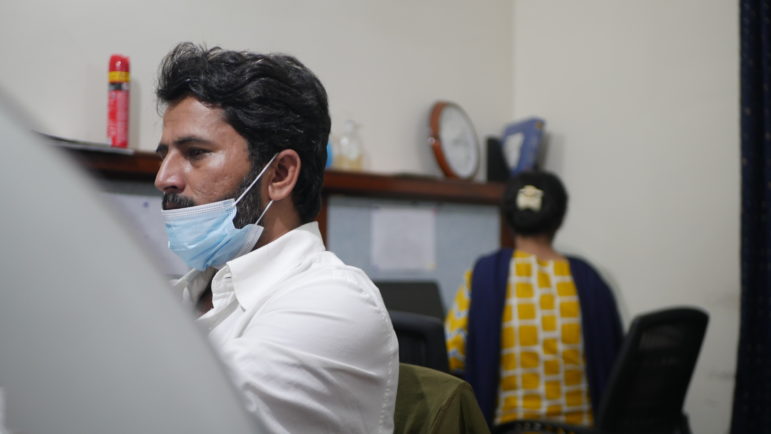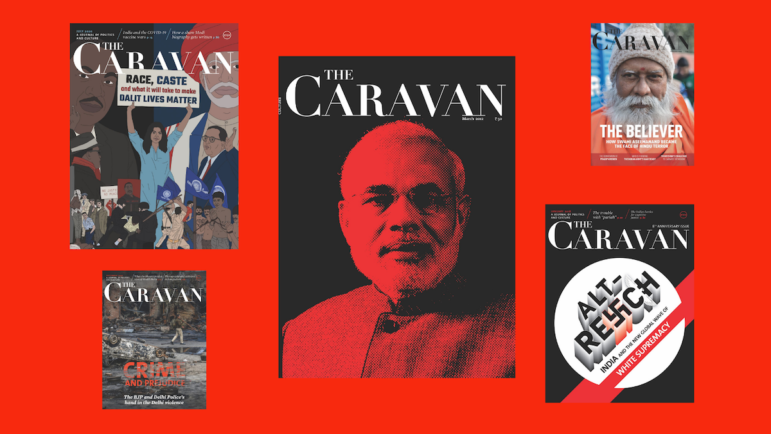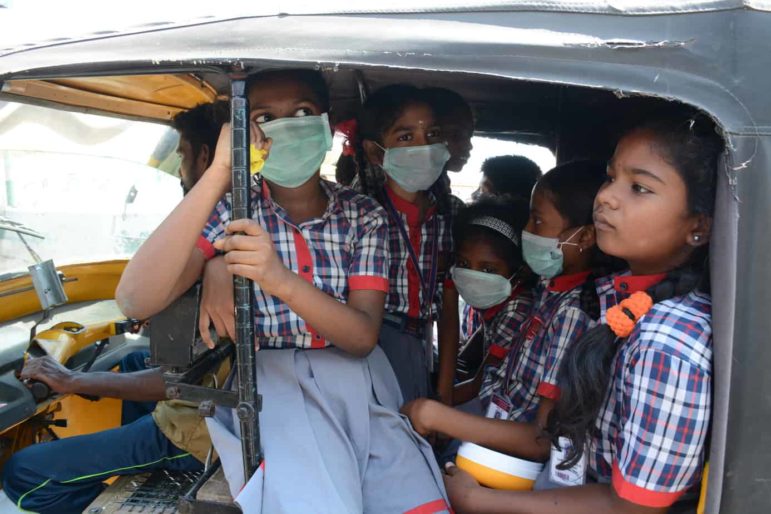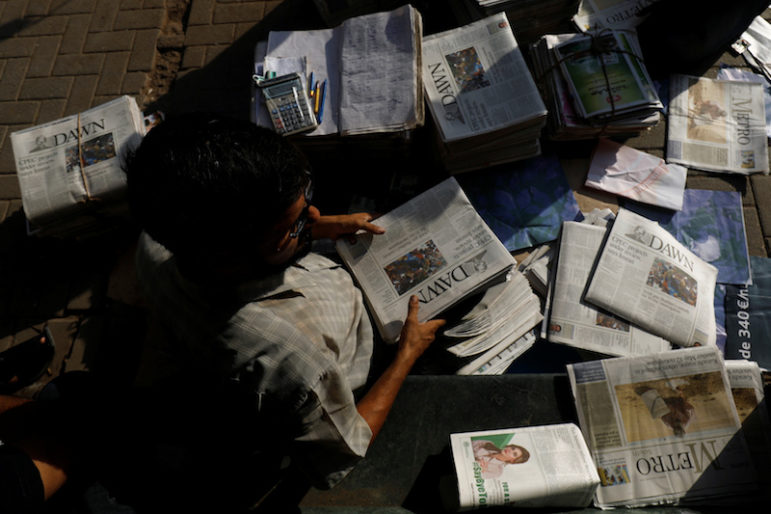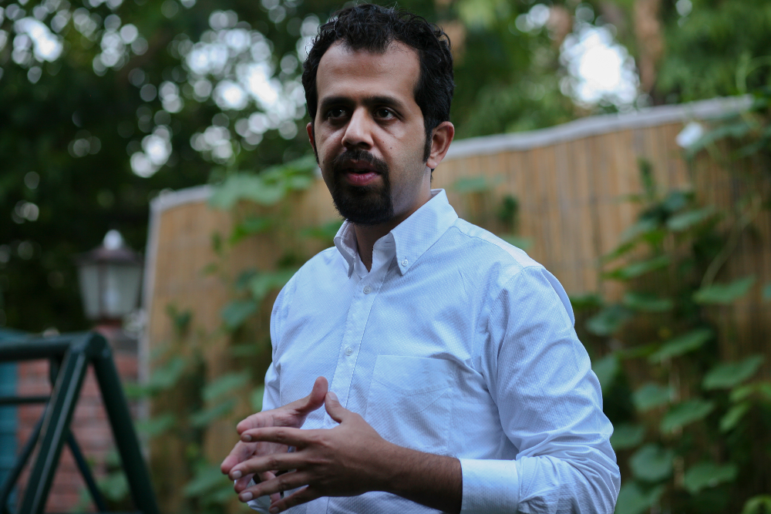

Meet the Exiled Pakistani Journalist Documenting Censorship in South Asian Newsrooms

Pragmatic Move: After a failed abduction attempt in Pakistan, Taha Siddiqui decided to move his family from Islamabad to safety in Paris. Photo: Sara Farid
While Pakistan continues to cement its reputation as one of the world’s most unsafe countries for journalists, there has been a strong pushback from young media professionals like Taha Siddiqui who refuse to bow down to the diktats of the country’s powerful military and intelligence agencies.
Siddiqui, 34, who was based out of Islamabad until earlier this year, and has now moved to Paris, is an example of dogged resistance. He is an award-winning investigative journalist whose work has appeared in the New York Times, The Guardian, France24, Christian Science Monitor and various other international news organisations. He has also served as the Pakistan Bureau Chief of the television channel World Is One News (WION).
The knowledge that he could become just another number in the roster of journalists and activists who have been killed in Pakistan for raising their voice against the establishment has not softened his critique. Even a failed abduction attempt that brought him very close to losing his life could not shut him up. Siddiqui was emboldened to carry on his work but made the pragmatic choice of seeking safety in Paris.
In an interview with The Wire, he talks about all the travails he has endured to assert his personal and professional freedom and a new initiative called safenewsrooms.org that he launched recently to unearth and document stories of censorship from newsrooms in South Asia.
Siddqui also speaks about the story he was working on at the time he was attacked — the story of Pakistani activist Raza Khan who worked on building peace between Pakistan and India by facilitating Skype conversations between children of both countries. June 2, 2018, marked six months of Khan’s enforced disappearance, allegedly at the hands of Pakistan’s security agencies.
Embed from Getty ImagesBelow are excerpts from an email interview.
Leaving Pakistan must have been a painful decision for someone like you who seems so committed to improving the situation back home in terms of civil liberties and media freedoms. What made you decide/realize that continuing to live in Pakistan was no longer an option?
I met with Ahsan Iqbal, Pakistan’s interior minister a few weeks before I decided to leave with my wife and my four-year-old son. He advised that I write a letter to the army chief asking for forgiveness. Then, another journalist friend met with the Pakistani Prime Minister Shahid Khaqan Abbasi and mentioned my case. He told him that, in such cases, the government is helpless.
That is when I realized that there is very little I can expect in terms of protection going forward. And since I wanted to continue speaking about freedom of expression, I chose to compromise my residency over compromising my right to speak freely. It has been a difficult period since I have moved, giving up the comforts of a settled life in Islamabad. But I wanted to tell the story, and live to tell it, and therefore the best option available was to relocate — at least for the time being.
How did you go about seeking asylum in France? What were the challenges that you and your family had to encounter during this time?
I have not yet gotten any asylum. I was offered a transfer by one of the news organizations I was employed with and that helped me. But it is a part time job and not a permanent one. I am looking for full-time work. Also, international journalist bodies and human rights organizations came forward to support me.
The challenges are numerous, from learning the language to adjusting to a different lifestyle, but that happens with anyone moving to a new country. In our case, the constant reminder when we encounter any problems is that this was not a choice — we were forced to move because of my work, and journalism is no crime.
A single day changed my life — from having a home to becoming homeless — uprooted from the country I was born in and that I have always called home. Fortunately, given my international connections, I was able to relocate and when I think of my journalist colleagues back home who are continuing to work in dangerous conditions, I at least feel a bit relieved that I no longer have to face the same.
Did you feel supported or let down by fellow journalists in Pakistan after you spoke publicly about escaping an abduction attempt and threats to your life? What kind of response were you expecting from your fraternity?
My peers were quite supportive but senior journalists in Pakistan disappointed me, especially those who I thought would stand by me in such troubling times. Most of these so-called senior journalists advised me to stay quiet, saying I had gotten a second chance.
Some advised having a reconciliation with the military through their contacts. Some even said that “I was asking for it” — so there was a lot of victim-blaming, especially by those who claim to be looking out for the journalistic community. It turned out that those who I knew well in the senior journalist community who, many a time I had even hosted at my house, totally disappeared on me. Instead, strangers among the journalist community came forward to support me — for example, the main journalist unions in Pakistan backed me and Young Journalists of Pakistan even held a protest against my failed abduction.
How would you describe the current environment in Pakistan as far as media censorship is concerned?
The space for independent and investigative media keeps shrinking in Pakistan. Mainstream media is being forced into censorship through threats, both physical and financial. I know of some cases where even advertisers are being asked to stop advertising with certain news organizations. The Pakistani military, which runs a shadow government, has managed to control all local Urdu news channels and newspapers, while the English-medium papers are also slowly falling in line. So, coverage stories regarding the military’s excesses are never reported and, at the same time, the propaganda by the military’s media wing is reproduced.

In the News: Between May 1, 2017, and April 1, 2018, 137 violations against journalists were recorded in Pakistan, according to the Pakistan Press Freedom Report 2018. Television journalists were the most victimized. Picture: Screenshot.
Though you are thousands of miles away from Pakistan, your resistance to media censorship in the country has only grown stronger with your new initiative — SAFE Newsrooms. Could you please share a bit about why you decided to create this platform and what you hope to accomplish through it?
Safenewsrooms.org is currently a self-funded digital media initiative that I launched this World Press Freedom day, May 3, 2018. The idea behind it is to give a voice to journalists in South Asia facing censorship. While the SAFE stands for safety, it also stands for South Asians for Freedom of Expression.
The website reaches out not only to those who exercise censorship, i.e., the media, but also to the victims of censorship, since there are many topics that are not reported in South Asia. In future, we plan to partner with international and local media organizations to expand our outreach, and also conduct training and advocacy programs to build capacities of journalists to fight back the censorship, which many have internalized, or face from external actors on a daily basis.
I want to continue working on human rights in Pakistan and South Asia, and given my reporting experience in this region, and my own recent harrowing experience of surviving an abduction attempt, I aim to build safenewsrooms.org into a platform through which South Asian journalists continue to fight back, just like I am.
Instead of focusing only on Pakistan, you have a wider mandate to highlight media censorship in the entire region — India and Bangladesh in particular. What are the common trends that you see in these three countries in terms of media ownership, and regulation by the state?
Across South Asia, freedom of expression, press and speech is being curtailed in different ways. In Pakistan, it is the military, the militants and the powerful business elite. In India, the Narendra Modi-led government is harassing the media, while many media owners and editors are supporting flawed narratives of the state as we saw recently in the sting operation carried out by a local Indian news organization that exposed the corruption among the senior hierarchy in news organizations.
In Bangladesh, we also see how secular voices and those speaking against the regime, the military, are silenced. Going forward, we plan to cover Sri Lanka as the media there is also not free. Also, Afghanistan and other countries in the South Asian region will be covered too.
The scope we have in mind is quite large, and that is why I am actively looking for funding options, as I can only do very limited work currently with the resources I have, especially in the circumstances I am in — with no proper job, and being in exile, things are already difficult, but I am not the kind who gives up when it comes to continuing to exercise my right to freedom of expression. I am confident safenewsrooms.org will achieve what it intends to.
One of the issues that you have been very vocal about is that of enforced disappearances and extra-judicial killings by the Pakistani military. After you moved to France, a strong non-violent movement against these state-sponsored atrocities has arisen in the form of the Pashtun Tahaffuz Movement. How would you assess the gains it has made so far?
The Pashtun Tahaffuz Movement has been challenging the military, and they are gaining numbers, which is setting quite a precedent. The Pashtun community is the second largest ethnicity in the country. I feel the movement is growing so fast because the message it has resonates with many Pakistanis today who are tired of the atrocities being carried out by the Pakistani military. And this is despite the media blackout they face in Pakistan. Just to let you know, I recently interviewed one of the movement leaders for safenewsrooms.org because of this censorship they face and I have also done a few pieces on media attitudes towards Pashtuns.
Despite the wide attention given to cases of enforced disappearances — at least on social media — there has been no progress in the case of Pakistani activist Raza Khan who was abducted in December 2017. In fact, you kept speaking about his case even after you were attacked. What are the legal options left for those who are still awaiting his return?
The courts and the police are helpless. From what I know, some of the authorities actually have an idea where Raza is and how he is being kept in a secret military prison, but everyone is too afraid to intervene because of the repercussions they may face from the military.
From what I last heard, but please cross check — the case has been dismissed by the courts, and referred back to an ineffective organization called The Commission of Inquiry on Enforced Disappearances, which has done nothing so far in recovering Raza or thousands of other Pakistanis who have disappeared and continue to disappear in Pakistan.
I would just like to mention here that these people are not missing, but are actually political prisoners who are even being denied the recognition of being prisoners. Here again, my project safenewsrooms.org comes into action as we recently carried an opinion by one of Raza’s friend about how Pakistani media censors stories when it comes to such abductions.
You were investigating Raza Khan’s case but apparently a lot of the material you had gathered was taken away by your attackers. What, according to you, remains unsaid about Raza’s story? What does the world need to know?
Yes, they took away my hard drive that had my story on Raza. As I mentioned, Raza’s story has not been covered extensively, especially in Pakistan, and therefore it needs to reproduced — that is the only tool we have to fight back and ensure that one day, the military releases him and others who they are reportedly keeping in illegal detentions.
In an open letter to the #PakistanArmy Chief, for the first time I write about my exile. I also talk abt attacks on press freedom in Pak, thru abductions of activists & journalists & recent shutdown of Geo. Finally I also focus on why dissent is important https://t.co/1vgsmb20GN
— Taha Siddiqui (@TahaSSiddiqui) April 6, 2018
On April 5, 2018, you wrote an open letter to the Army Chief, which was published in The Guardian. On February 20, you spoke at the Geneva Summit for Human Rights and Democracy about your life in exile. How does your voice at these international forums help to strengthen grassroots struggles back home?
Many internationally believe Pakistan is a democracy, ever since [Pervez] Musharraf was ousted in 2007, but very few know that since the restoration of a democratic setup, the military has actively continued to run the country, while putting up a facade of an elected government. Through my international activism I am trying to give a voice to the people of Pakistan who are oppressed on a daily basis by the Pakistan Army, and dare not to talk about them. Some even co-opt.
I get invited regularly to speak at different forums, and my aim is to not just raise awareness about human rights abuses in Pakistan but also remind the international community of its commitment in upholding values that modern civilized societies practice, and which are violated by Pakistan and therefore the global community has to speak up too instead of being silent spectators due to diplomatic or business concerns they might be engaged with when it comes to a relationship with Pakistan.
What are you planning to do in the months ahead, with Pakistan’s general elections round the corner, and your own challenges with adjusting to life in a new country?
I plan to resume my print and television reporting for different international outlets. My main focus is safenewsrooms.org and as I mentioned earlier, I am looking at ways to expand our coverage and resources so I am looking finding partners to work with me on this initiative.
With Nawaz Sharif being disqualified from contesting elections, and Imran Khan cozying up to the Taliban, what does the future hold for democratic institutions and processes in Pakistan?
As we are seeing, leading up to the elections Nawaz is even being censored on mainstream media – another issue that we have covered on safenewsrooms.org. There is a lot of pre-poll rigging going on right now and no one wants to report it as it is, and therefore the upcoming elections are unlikely to be fair or free if the situation remains the same. We have already seen a compromised media and judiciary. Next up is the parliament — and we have already seen that in the senate, where they manipulated the vote to bring in a military-friendly chairperson. The military is well on its way to ensure complete control or as some refer to it nowadays — a soft coup where all other institutions are just for cosmetics.
This article originally appeared in The Wire, a news website published by the Foundation for Independent Journalism, a non-profit Indian company. It is cross-posted here with permission.
 Chintan Girish Modi is a freelance journalist, educator, researcher and current affairs commentator based in Mumbai. He has written for the The Hindu, Indian Express, and Times of India, among others. He writes about peace and conflict, arts and culture, gender and social justice, and facilitates media literacy workshops with high school students and peace journalism workshops with college students.
Chintan Girish Modi is a freelance journalist, educator, researcher and current affairs commentator based in Mumbai. He has written for the The Hindu, Indian Express, and Times of India, among others. He writes about peace and conflict, arts and culture, gender and social justice, and facilitates media literacy workshops with high school students and peace journalism workshops with college students.





